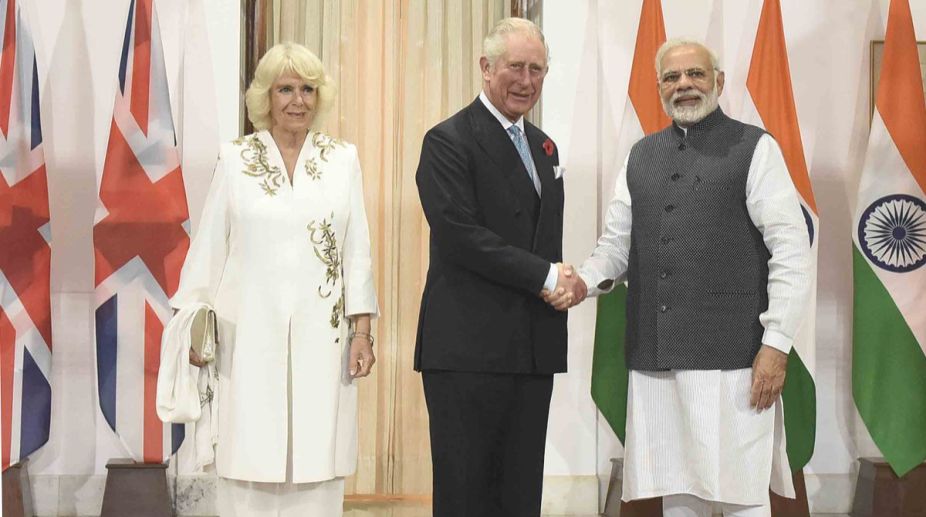Mohanlal, Shreya Ghoshal, and others join PM Modi’s call to tackle obesity
PM Modi's initiative encourages Indians to reduce cooking oil consumption by 10% to tackle rising obesity. Celebrities, athletes, and leaders are joining the movement.

(L-R) Duchess of Cornwall, Prince of Wales, PM Narendra Modi (Photo: Twitter)
It has been a high season for diplomatic visits in the capital this week. The visit of the Prince of Wales along with the Duchess of Cornwall, as a part of a four nation, ten-day Asia tour, stands out as it is anticipated that the focus of the meetings will be on climate change and economic cooperation, in the backdrop of the upcoming Commonwealth Heads of Government Meet (CHOGM) in London, April 2018.
The fact that Prince Charles is expected to personally invite Prime Minister Modi to CHOGM is a clear indication of the larger role that Britain would like to see India playing in the Commonwealth. Interestingly two Indian Prime Ministers, Manmohan Singh and Narendra Modi, have chosen to skip CHOGM in the past – 2011, 2013 and 2015. This in itself is a clear signal of India’s stance on the Commonwealth. In fact, despite India’s position as the fourth largest contributor to the Commonwealth budget, it has thus far not gained much from the forum.
Advertisement
It perhaps views the Commonwealth as redundant for it may be argued that it no longer has any geopolitical role or relevance. It failed, on multiple occasions, to enforce its values of democracy, peace, human rights and rule of law. This failure was most evident in its approach towards Mahinda Rajapaksa’s Sri Lanka, the 1995 events in Nigeria and the 1999 coup in Pakistan. Further, it can no longer claim to be a key voice in the advocacy of Sustainable Development Goals (SDGs) as long as the United Nations remains a dominant player in the international sphere.
Advertisement
Besides, the Commonwealth has famously witnessed the withdrawal of membership from nations such as Maldives in 2016 and Gambia in 2013, and is often criticised for being an extension of colonialism.
Yet, the Commonwealth boasts of a diverse member body with a shared history that India can tap. The Commonwealth’s biggest drawback is that it lacks a strong and committed leader. This is where India can step in to fill the vacuum and transform the Commonwealth into a more relevant organisation.
In doing so, it can be used as a tool through which India can spread her soft power. However, India’s approach to soft power has to go beyond Bollywood, yoga and Indian food. It must truly draw on what Joseph Nye, the neo-liberal academician who coined the term had envisioned. Nye claimed that a country will be able to alter the behaviour of others to suit its needs without using coercion, but rather attraction. This soft power takes the form of culture, political values and foreign policies. So, India must try to change the perception of the 52 members and project itself as a strong power, and certainly one that can guide the developing world.
In addition, two separate studies – by Berthou (2013) and De Sousa (2010) – have shown that former colonies tend to trade with each other and their former coloniser more than any other country. This phenomenon can be attributed to their shared histories and the existence of old trade routes. For example, the British had established trade routes between India, Kenya, South Africa, Australia and New Zealand.
The real potential of the Commonwealth lies here. It no longer comes as a surprise that Britain is trying hard to revive the Commonwealth in the wake of Brexit, as it finds itself in desperate need of new trade partners. India can benefit by leveraging its status in the Commonwealth to improve her trade relations with Africa and South America whose markets continue to be untapped. Another added layer is the “China angle”. Will India stand to gain more by actively engaging with the Commonwealth, in the backdrop of a rising China? The answer is very complex, but two important trends and observations emerge.
Firstly, India needs forums to counterbalance China and it’s One Belt One Road policy. It is also in need of forums like the Commonwealth, where China is not a dominant member. It is pertinent to point here that even in a forum like SAARC, China enjoys observer status. Secondly, considering the uncertainty of India’s membership to the United Nations Security Council (UNSC), the Commonwealth may present itself as a small part of a larger solution. Nonetheless, the CHOGM 2018 conference is an opportunity for India.
It gives India the bargaining power with Britain to carve out a larger role for itself in The Commonwealth. India can leverage Britain’s need for stable trade partners, and Prince Charles visit is timely in this regard.
(The writer is associated with the Observer Research Foundation.)
Advertisement